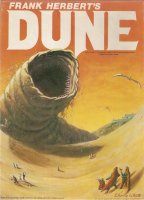
Book: Frank Herbert's Dune
Dune is a science fiction story set in a distant future where noble houses rule different planets, alongside an Emperor and his elite Sardaukar troops, and a powerful trading guild that controls space travel. The plot follows a young Paul Atreides and his family as they take charge of Arrakis, a desert planet that is the only source of a valuable substance called melange or 'spice'. The spice extends life and enhances mental abilities, and it is crucial for space travel. The Atreides arrive to Arrakis to control it by the Emperor's orders, but things won't be as easy. The story explores complex themes of politics, religion, ecology, technology, and human emotions as different factions in the empire clash over control of the planet and its invaluable spice.
Yet another timeless classic that I had pending and decided to go for. In this case, even more so because Dune 2 is one of my all time favourite videogames, so I felt I had a pending debt to settle. And I like both the old and new movies, so needed to see the source of it all.
I've enjoyed the book so much so as to plan to keep reading at least one more book (potentially until God Emperor of Dune, included). I knew it was good but didn't expected to hook me in so much. At times it felt like The Lord of The Rings, providing long and detailed descriptions of seemingly trivial characters, scenarios and details. Then, the "characters thinking" technique (you read what they think at times, not only what they say) is different and interesting, providing with additional details and more insight on how and why different characters act the way they do.
It is also different from what I expected: The scarce technology (the Ornithopters, meelee shields, spice harvesters, and some "laser weapons", but not much more) was a surprise to me; In the strategy videogame there are tons of vehicles, troops with different long range weapons, but in the book fuel is scarce and vehicles at times deteriorated, combats are mostly melee, and in general everything feels not as futuristic as you'd imagine. Reading at Wikipedia I saw that the author wanted to replicate a feudalism-like setting, much more focused on the human and politics side of things, and it is clearly there.
The only thing that I can complain about is that the pacing begins very slow, but speeds up and actually jumps ahead years by the end (few, but still), giving the sensation that you missed something in the middle. It is a long book, and yet I expected more things to happen in the kind of "final story arc", instead being a bit short. But maybe was just me wanting to read more about the intriguing Fremen, the Shai-hulud, and Arrakis itself.
A sci-fi must read.
Tags: Books